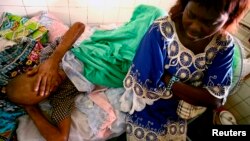YAOUNDE, CAMEROON —
A study published in the World Diabetes Atlas says that more than 80 percent of people living with diabetes in sub-Saharan Africa do not know that they suffer from the disease. Sub-Saharan Africa has more than 15 million of the 371 million people living with diabetes in the world.
The report states that diabetes is a global burden as the number of people living with the disease continues to rise. But it says the situation is worse in sub-Saharan Africa.
Dr. Palma Mesumbe of the Cameroon Diabetes Association said even in North Africa where many more people visit hospitals, half of the patients did not know that they had diabetes.
“It is clearly established today that the number of diabetics is increasing on the day. Half of the people who have diabetes do not know they have it. We are talking about 52.9 percent for instance in North Africa that do not know that they have diabetes,” said Dr. Mesumbe.
The World Diabetes Atlas study adds that the greatest number of people with diabetes are between the ages of 40 and 59. Another medic, Dayawa Akuns, said a lot more within the same age group may be living with diabetes without knowing it, since symptoms can only be noticed at chronic stages.
“At the moment when we have the signs and symptoms of diabetes, it is assumed that more than 50 percent of the cells that have the responsibility to produce insulin have been destroyed. Over time as these cells are being destroyed, we are not going to see the symptoms because it has not reached a particular threshold to trigger signs and symptoms,” said Akuns.
It is projected that by 2031 the number of people living with the disease will increase to more than 552 million. Palma Mesumbe said that it would be a serious problem, especially in Africa which is socially and economically disadvantaged.
“It's going to be a problem in Africa where we are going to see a doubling in the prevalence of diabetes. We are at 4.3 percent and in 20 years that percentage is going to double, and the problem is how ready are we to handle that situation,” said Dr. Mesumbe.
To control the situation, the report says governments must reinforce diabetes awareness strategies and support associations fighting the disease.
The report states that diabetes is a global burden as the number of people living with the disease continues to rise. But it says the situation is worse in sub-Saharan Africa.
Dr. Palma Mesumbe of the Cameroon Diabetes Association said even in North Africa where many more people visit hospitals, half of the patients did not know that they had diabetes.
“It is clearly established today that the number of diabetics is increasing on the day. Half of the people who have diabetes do not know they have it. We are talking about 52.9 percent for instance in North Africa that do not know that they have diabetes,” said Dr. Mesumbe.
The World Diabetes Atlas study adds that the greatest number of people with diabetes are between the ages of 40 and 59. Another medic, Dayawa Akuns, said a lot more within the same age group may be living with diabetes without knowing it, since symptoms can only be noticed at chronic stages.
“At the moment when we have the signs and symptoms of diabetes, it is assumed that more than 50 percent of the cells that have the responsibility to produce insulin have been destroyed. Over time as these cells are being destroyed, we are not going to see the symptoms because it has not reached a particular threshold to trigger signs and symptoms,” said Akuns.
It is projected that by 2031 the number of people living with the disease will increase to more than 552 million. Palma Mesumbe said that it would be a serious problem, especially in Africa which is socially and economically disadvantaged.
“It's going to be a problem in Africa where we are going to see a doubling in the prevalence of diabetes. We are at 4.3 percent and in 20 years that percentage is going to double, and the problem is how ready are we to handle that situation,” said Dr. Mesumbe.
To control the situation, the report says governments must reinforce diabetes awareness strategies and support associations fighting the disease.








